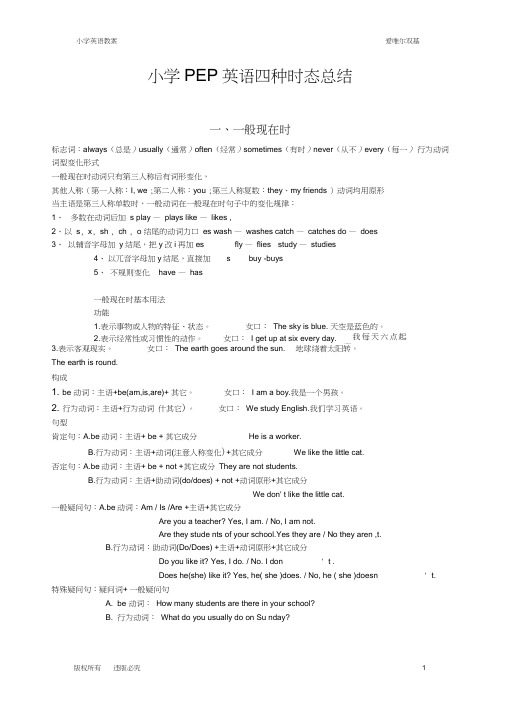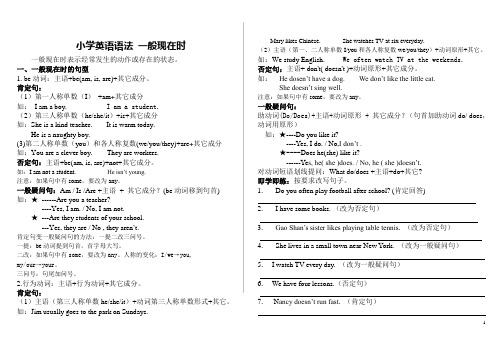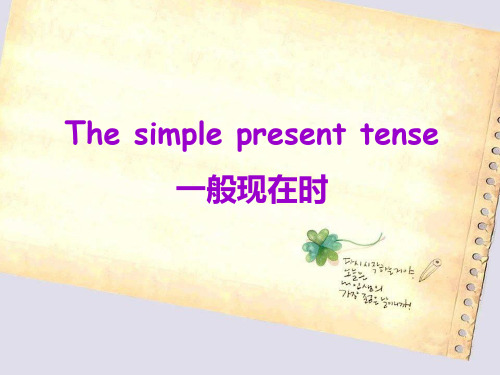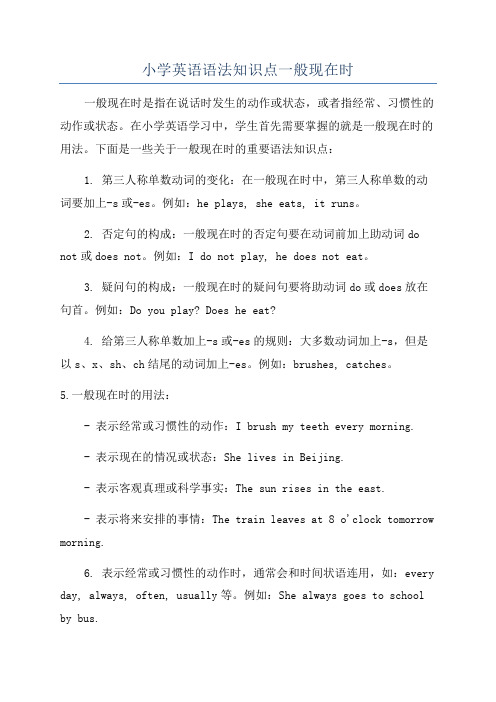一般现在时 小学英语 语法
小学英语语法时态一般现在时详解

小学英语语法时态一般现在时详解一、概念1.表示经常性或习惯性的动作,常与表示频度的时间状语连用。
如:al ways, usually, often, sometimes, seldom(很少), never(决不), every day, at 8:30, on Sunday,in the morning等。
如:I always get up at 6:00 in the morning.2.表示现在时刻的状态、能力、性格、个性。
如:She loves English very much. My sister can play the piano very well.3.表示客观的事实。
如:The sun rises in the east. 太阳从东方升起。
4.格言或警句。
如:Pride goes before a fall.骄者必败。
二、句子结构1.如果句子主语的人称是I, we, you, they或复数名词时,动词用动词原形。
如:We often go home by bus.2.如果句子的主语是第三人称单数,即:he, she, it 或单数名词时,动词要用第三人称的单数形式。
如:He often goes home by bus三、动词的第三人称单数构成规则1.一般情况下在动词的后面直接加“s”;如:work→works play→plays¬ rain→rains see→sees visit→visits2.以o, x,s,sh, ch结尾的动词,在后面加“es”;如:do→does fix→fixes guess→guesses wash→washes teach→teaches3.以辅音字母加y结尾的动词,先把“y”改为“i”, 再加“es”;如:fly→flies study→studies carry→carries4.不规则变化。
如:have→has四、注意在一般现在时的句子中,如果前面使用了助动词does, doesn’t, will, won’t, can, can’t, would, wouldn’t, must, mustn’t 等,尽管主语是第三人称单数,后面的动词用动词原形。
(完整版)小学英语时态总结

小学PEP英语四种时态总结一、一般现在时标志词:always(总是)usually(通常)often(经常)sometimes(有时)never(从不)every(每一)行为动词词型变化形式一般现在时动词只有第三人称后有词形变化,其他人称(第一人称:I, we ;第二人称:you ;第三人称复数:they、my friends )动词均用原形当主语是第三人称单数时,一般动词在一般现在时句子中的变化规律:1、多数在动词后加s play —plays like —likes ,2、以s, x, sh , ch , o 结尾的动词力口es wash —washes catch —catches do —does3、以辅音字母加y结尾,把y改i再加es fly —flies study —studiess buy -buys4、以兀音字母加y结尾,直接加5、不规则变化have —has一般现在时基本用法功能1.表示事物或人物的特征、状态。
女口:The sky is blue. 天空是蓝色的。
2.表示经常性或习惯性的动作。
女口:I get up at six every day. 我每天六点起床。
3.表示客观现实。
女口:The earth goes around the sun. 地球绕着太阳转。
The earth is round.构成1. be 动词:主语+be(am,is,are)+ 其它。
女口:I am a boy.我是一个男孩。
2. 行为动词:主语+行为动词什其它)。
女口:We study English. 我们学习英语。
句型肯定句:A.be动词:主语+ be + 其它成分He is a worker.B.行为动词:主语+动词(注意人称变化)+其它成分We like the little cat.否定句:A.be动词:主语+ be + not +其它成分They are not students.B.行为动词:主语+助动词(do/does) + not +动词原形+其它成分We don' t like the little cat.一般疑问句:A.be动词:Am / Is /Are +主语+其它成分Are you a teacher? Yes, I am. / No, I am not.Are they stude nts of your school.Yes they are / No they aren ,t.B.行为动词:助动词(Do/Does) +主语+动词原形+其它成分Do you like it? Yes, I do. / No. I don ' t .Does he(she) like it? Yes, he( she )does. / No, he ( she )doesn ' t.特殊疑问句:疑问词+ 一般疑问句A. be 动词:How many students are there in your school?B. 行为动词:What do you usually do on Su nday?一般现在时动词 be 和have 的变化形式 1. 动词Be 叫连系动词,用法:第一人称单数用 am ,第三人称单数用is ,其它人称用are 。
小学英语语法_一般现在时

小学英语语法一般现在时一般现在时表示经常发生的动作或存在的状态。
一、一般现在时的句型1. be动词:主语+be(am, is, are)+其它成分。
肯定句:(1)第一人称单数(I)+am+其它成分如:I am a boy. I am a student.(2)第三人称单数(he/she/it)+is+其它成分如:She is a kind teacher. It is warm today.He is a naughty boy.(3)第二人称单数(you)和各人称复数(we/you/they)+are+其它成分如:You are a clever boy. They are workers.否定句:主语+be(am, is, are)+not+其它成分。
如:I am not a student. He isn’t young.注意:如果句中有some,要改为any。
一般疑问句:Am / Is /Are +主语+ 其它成分?(be动词移到句首) 如:★------Are you a teacher?----Yes, I am. / No, I am not.★---Are they students of your school.---Yes, they are / No , they aren’t.肯定句变一般疑问句的方法:一提二改三问号。
一提:be动词提到句首,首字母大写。
二改:如果句中有some,要改为any。
人称的变化:I/we→you,my/our→your。
三问号:句尾加问号。
2.行为动词:主语+行为动词+其它成分。
肯定句:(1)主语(第三人称单数he/she/it)+动词第三人称单数形式+其它。
如:Jim usually goes to the park on Sundays.Mary likes Chinese. She watches TV at six everyday.(2)主语(第一、二人称单数I/you和各人称复数we/you/they)+动词原形+其它。
小学英语语法一般现在时总结

千里之行,始于足下。
学校英语语法一般现在时总结学校英语语法一般现在时总结一般现在时是英语中最基础和最常用的时态之一,它用来表达经常性的、重复性的或普遍性的动作或状态。
在学校英语学习中,同学们需要把握一般现在时的用法和构造。
一般现在时的构造:一般现在时的确定句的构造为:主语 + 动词原形(第三人称单数要加-s 或-es)+其他。
例句:I play football every day.He plays football every day.She watches TV on weekends.一般现在时的否定句的构造为:主语 + do not / does not + 动词原形 +其他。
例句:I do not play football every day.He does not play football every day.She does not watch TV on weekends.一般现在时的疑问句的构造为:Do / Does + 主语 + 动词原形 +其他?例句:Do you play football every day?Does he play football every day?Does she watch TV on weekends?一般现在时的用法:1. 表示经常性的动作或习惯。
第1页/共3页锲而不舍,金石可镂。
例句:I brush my teeth before going to bed.She always eats an apple in the morning.They usually walk to school.2. 表示普遍性的事实或真理。
例句:Water boils at 100 degrees Celsius.The sun rises in the east.Dogs are loyal animals.3. 表示现阶段的状态。
例句:I am a student.She is a teacher.They are happy.4. 描述行程支配或固定时间的动作。
小学英语语法-一般现在时详细讲解

特殊疑问句:疑问词+be+主语+其它?
如: What is he? What colour is that bird? How old are you? Where are they ?
二. 实义动词的一般现在时
1、什么叫实义动词?
实义动词是指表示有具体意思的动词, 也叫行为动词。 如: like(喜欢), eat(吃), live(居住), have(有), run(跑) 等等。 实义动词占英语中动词的绝大多数。
我们已学过的be 动词可译成“是”,
有时译成“成为”,有时则没有具体意 思如: “She is tall.”这句译成: “她很 高”。故be 动词不属于实义动词。
2、一般现在时实义动词作谓语的时侯有两种形式:
1. 动词原形;如: enjoy 2. 第三人称单数动词形式;如: enjoys
主语 +
How do you spell it? 特殊疑问句: 疑问词+一般疑问句 How does he spell it?
直接回答,而不用yes 或no.
5.一般现在时的句型变换
1) I usually play football on Friday.
改为一般疑问句: Do you usually play football on Friday?
The simple present tense 一般现在时
我的功能
1. 表示经常性、习惯性的动作或状态
I wash the dishes every day. You sometimes take a bus home. They usually have lunch at 11:30. He always gets up early. She is often late for school.
小学英语语法-一般现在时详细讲解

小学英语语法-一般现在时详细讲解一般现在时是英语语法中最基础也是最常用的时态之一。
它表示的是习惯性、经常性和普遍性的行为或状态。
在本文中,我将详细介绍一般现在时的形式、用法和注意事项。
一、一般现在时的形式一般现在时的肯定句的基本结构是:主语+谓语动词+其他。
谓语动词在第三人称单数形式时要加上-s或-es。
例如:- I eat breakfast every morning.(我每天早上吃早饭。
)- She goes to school by bus.(她坐公共汽车去学校。
)否定句的结构是:主语+do not/does not+动词原形+其他。
例如:- I do not like coffee.(我不喜欢咖啡。
)- He does not play football.(他不踢足球。
)疑问句的结构是:Do/Does+主语+动词原形+其他?例如:- Do you like ice cream?(你喜欢冰淇淋吗?)- Does she go to the park every weekend?(她每个周末去公园吗?)二、一般现在时的用法第1页/共4页1. 表示习惯或经常性的动作:- I write in my diary every night.(我每天晚上写日记。
)- They play basketball every Sunday.(他们每个星期天打篮球。
)2. 表示客观事实、自然规律或科学真理:- Water boils at 100 degrees Celsius.(水在100摄氏度时煮沸。
)- The sun rises in the east.(太阳从东方升起。
)3. 表示感觉、想法和喜好:- I love chocolate.(我喜欢巧克力。
)- He hates to wake up early.(他讨厌早起。
)4. 表示现时状态或现时临时的动作:- I am a student.(我是一个学生。
小学英语语法_一般现在时详细讲解

千里之行,始于足下。
学校英语语法_一般现在时具体讲解一般现在时(Simple Present Tense)是英语中最基本的时态之一,用来表达经常性或习惯性的动作、客观事实、常规活动等。
以下是一般现在时的具体讲解。
1. 构成:主语 + 动词原形(第三人称单数要在动词后加-s)+ 其他。
例如:- I play soccer on weekends.(我周末踢足球。
)- He watches TV every evening.(他每天晚上看电视。
)2. 主语:一般现在时的主语可以是第一人称、其次人称或第三人称。
例如:- I go to school every day.(我每天去上学。
)- You like ice cream.(你宠爱冰淇淋。
)- She plays the piano well.(她弹得很好。
)3. 动词的变化:- 第三人称单数一般在动词后面加上-s或-es。
例如:he/she/itplays(he plays,she plays,it plays),he/she/it watches(he watches,she watches,it watches)。
- 一般现在时的否定形式是在动词前面加上do not(don’t)或does not(doesn’t)。
例如:I do not dance(我不跳舞),She does not like coffee(她不宠爱咖啡)。
- 一般现在时的疑问形式是把do或does放在主语前面。
例如:Do you play tennis?(你打网球吗?),Does she go to the gym?(她去健身房吗?)4. 使用场景:第1页/共2页锲而不舍,金石可镂。
- 表达经常性或习惯性的动作。
例如:I eat breakfast every morning.(我每天早上吃早餐。
)- 表达客观事实、普遍真理等。
例如:The sun rises in the east.(太阳从东方升起。
小学英语语法知识点一般现在时

小学英语语法知识点一般现在时一般现在时是指在说话时发生的动作或状态,或者指经常、习惯性的动作或状态。
在小学英语学习中,学生首先需要掌握的就是一般现在时的用法。
下面是一些关于一般现在时的重要语法知识点:1. 第三人称单数动词的变化:在一般现在时中,第三人称单数的动词要加上-s或-es。
例如:he plays, she eats, it runs。
2. 否定句的构成:一般现在时的否定句要在动词前加上助动词do not或does not。
例如:I do not play, he does not eat。
3. 疑问句的构成:一般现在时的疑问句要将助动词do或does放在句首。
例如:Do you play? Does he eat?4. 给第三人称单数加上-s或-es的规则:大多数动词加上-s,但是以s、x、sh、ch结尾的动词加上-es。
例如:brushes, catches。
5.一般现在时的用法:- 表示经常或习惯性的动作:I brush my teeth every morning.- 表示现在的情况或状态:She lives in Beijing.- 表示客观真理或科学事实:The sun rises in the east.- 表示将来安排的事情:The train leaves at 8 o'clock tomorrow morning.6. 表示经常或习惯性的动作时,通常会和时间状语连用,如:every day, always, often, usually等。
例如:She always goes to school by bus.7. 表示现在的情况或状态时,通常与be动词连用,如:am, is, are。
例如:I am a student.8. 表示客观真理或科学事实时,通常不和时间状语连用。
例如:Water boils at 100 degrees Celsius.9.一般现在时中的一些特殊用法:- 示意要求或建议的动词(如:want, need, like, love, hate等)后接不定式,用法类似于祈使句。
- 1、下载文档前请自行甄别文档内容的完整性,平台不提供额外的编辑、内容补充、找答案等附加服务。
- 2、"仅部分预览"的文档,不可在线预览部分如存在完整性等问题,可反馈申请退款(可完整预览的文档不适用该条件!)。
- 3、如文档侵犯您的权益,请联系客服反馈,我们会尽快为您处理(人工客服工作时间:9:00-18:30)。
Lily often writes to her uncle in the U.S.A. Does Lily often write to her uncle in the U.S.A?
D. 特殊疑问句:
疑问词+一般疑问句? I like playing football.
What do you like?
一般现在时表示经常发生的、习惯性的动作或存 在的状态。与频率副词usually ,often, sometimes ,always和时间短语in the morning /afternoon/evening, at noon/night , every day/week/year/month 连用 其构成为:
Mary sings songs every Thursday.
my father and I go swimming
every sunday
My father and I go swimming every Sunday
he
play basketball every Saturday
He plays basketball every Saturday.
3 Jim ______(go) shopping on Sundays. goes
4 There ___(be) some bread on the table. is
二 翻译句子。 1 他每天七点上学。
He goes to school at 7:00 every morning.
2 每周五下午,他们去游泳。
my mother
read books every morning
My mother reads books every morning.
we
play football
every Wednesday
We play football every Wednesday.
Mary
sing songs
every Thursday
Does Kate come from America?
• • • • • •
Where Which What When Why How
根据图画利用所学的一般现在时造句。 Jim play computer games every Monday
Jim plays computer games every Monday.
B. 否定句:主语+don’t/ doesn’t+动词原形 +其他。 I study English every morning. I don’t study English every morning. We speak Chinese. We don’t speak Chinese.
Jim likes playing football.
Read and think
1. I study English every morning.
2. I like to eat hamburgers. 3. Kate comes from America.
4. Jim plays football every Tuesday. 5. They often watch TV in the evening.
A.肯定句: 主语+动词(原形或第三人称单数)+其 他。
I study English every morning.
We speak Chinese.
Jim likes playing football.
当主语是第三人称单数时,动词需变 化
1) 直接+s
2) sh,ch,o ,s 结尾+es 3) 以辅音+y 结尾,变y 为 i + es
Do you like playing football Does Jim eat any bread every morning?
Jim eats some bread every morning. What does Jim eat every morning? Kate comes from America. Where does Kate come from?
they go shopping every Sunday They go shopping every Sunday.
一、 用动词的适当形式填空。
1 She ____(get) up at 6:30 every morning gets 2 His father ______(ride) a bike to go to rides work every day.
They go swimming every Friday afternoon.
3 她每天都写作业吗?
Does she do her homework every day?
4 你周日都经常做什么?
What do you usually do every Sunday?
5 你有词典吗?
Do you have a dictionary?
Jim doesn’t like playing football.
C. 一般疑问句:
Do/ Does +主语+动词原形+其他? I come from China. Do you come from China?
Kate likes singing every morning. Does Kate like singing every morning?
